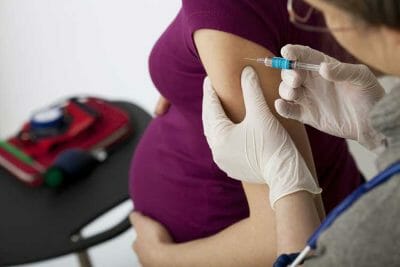How Does HCG Injection Help in Pregnancy?
One of the most important hormones in women is human chorionic gonadotropin (HCG), which is made by the pituitary gland. During pregnancy, HCG levels change, just like oestrogen and progesterone levels do. Since the placenta usually makes HCG, it can cause ovulation and make it more likely that a woman will get pregnant.
Human chorionic gonadotropin makes progesterone levels higher, which helps a woman get pregnant. On the other hand, HCG is sometimes injected as part of treatments for infertility to get the ovaries to work.
After giving birth, HCG levels go up. So, you can find out if you are pregnant with a blood test after 11 days or with a urine test after 12 to 14 days.
How does HCG get made in a pregnant woman?
The placenta of a pregnant woman makes a glycoprotein called HCG hormone, especially in the first few weeks of pregnancy, to help make progesterone and stop the woman’s period. Since HCG levels rise over time, they double every 48 or 72 hours during the first 10 weeks of pregnancy.
HCG Injections and Being Expectant
The HCG injection is a very important part of being pregnant. This drug is the same as luteinizing hormone (LH) because it makes follicles grow normally, stimulates the ovaries, and causes ovulation. The pituitary gland produces LH hormone as a chemical. It causes ovulation to happen naturally and is used in IVF treatment because of this.
HCG shots help treat infertility in women. You can purchase hcg injections online at Fatboy Fitman.
How much HCG should be injected?
For treating infertility in women, the average dose of an hCG trigger shot is between 5000 and 10000 units. Even though this dose may seem high, the medical team will come up with a good plan for injecting the HCG intramuscularly or subcutaneously. Injections of 1,000 to 4,000 units of HCG are given twice or three times a week for several weeks or months to help men make more sperm.
Where and how do I put HCG into my body?
Whether the HCG is in liquid or powder form in the vial affects how the injection is given. When you get liquid HCG from the pharmacy, you should put it in the fridge right away (within 3 hours) and not take it out until it’s time to give yourself an injection. It is important to know that HCG liquid that has not been kept cold should never be injected into the body. But because HCG-containing liquid is usually painful to inject directly, it is better to warm up the vial by holding it between your hands before injection.
On the other hand, HCG powder can be stored at room temperature. During an injection, 1 cc of bacteriostatic water should be drawn into the syringe, poured into the powdered vial, and then slowly rotated. You should never use tap water or spring water to make this solution.
You can mix the powder and water by gently rolling the vial with the solution in it between your hands.
Because shaking the vial might make the HCG less effective. After drawing the solution into the syringe and getting rid of the air, the doctor will tell you where to give the HCG injection.
Who shouldn’t get an HCG shot?
Not everyone is a good fit for HCG injections. This drug shouldn’t be given to people with the following conditions, unless the doctor thinks it’s necessary in a special case:
- Asthma;
- pregnant or think they might be;
- Epilepsy;
- Cardiovascular diseases;
- cancers that depend on androgens, especially cancers of the ovary, breast, uterus, prostate, hypothalamus, and pituitary;
- Kidney problems;
- Reaction to HCG that is allergic;
- abnormal uterine bleeding
- Hormonal disorders;
- Drug sensitivity;
- a problem with the thyroid or adrenal glands
What are the risks and side effects of an HCG injection?
Like many other drugs, HCG ampoules come with risks and side effects. Some of these are:
- Allergic reactions (which can be checked for before injection with a skin test);
- pain, especially sudden pain in the lower stomach area;
- Headache;
- a rise in irritation;
- Mood swings;
- Fatigue;
- Depression;
- Syndrome of Overstimulation of the Ovaries (OHSS)
- ovarian cancer (in rare cases).
What are the risks of getting an HCG shot while you’re pregnant?
Even though HCG shots can help treat infertility in women, they should not be used during pregnancy. The reason is that it can harm the nervous system of an embryo before it is born. So, if a woman gets pregnant or even thinks she might be pregnant, she should stop taking HCG and call her doctor right away. Also, HCG injections shouldn’t be given in larger amounts or for longer periods of time than the doctor says.
When should you get an HCG shot?
When a person is ovulating, it is the best time to give them an injection of human chorionic gonadotropin if they have tried many times to get pregnant but have been unsuccessful. Most of the time, ovulation happens 12 to 16 days before the next period. Within 24 hours of ovulation, there is a chance of getting pregnant. So, the doctor will use an ultrasound to check the size of the follicles and then inject HCG if the size of the follicles is right.
Can men get HCG injections?
Hypogonadism in men can be treated with HCG shots (low testosterone production). The higher levels of HCG can make the body make more testosterone, which can increase the number of sperm in men. So, HCG injections can be very helpful when a man can’t have children because he doesn’t have enough sperm.
